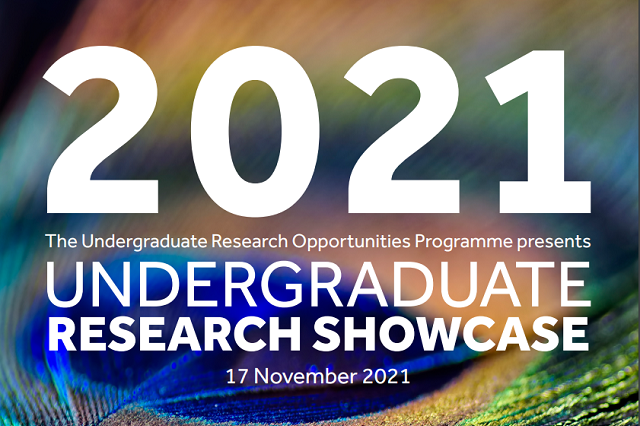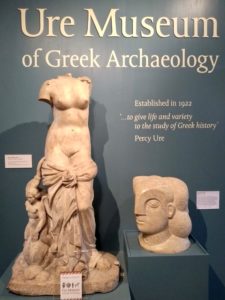The Undergraduate Research Opportunities Programme (UROP) offers undergraduate students the chance to gain hands-on research experience on projects covering all disciplines across University. These projects take the form of a paid six-week placement during the summer vacation. Ninety-one students submitted their research projects for the showcase which demonstrates the breadth of research being undertaken as well as our support for undergraduate students.
A small judging panel of former UROP supervisors viewed all ninety-one screencasts and selected four theme winners. Each will receive a small prize and be supported to attend UK undergraduate research conference in 2022.

We talked to the four winning students:
 Agriculture, Food & Health
Agriculture, Food & Health
Chloe Mayne
Assessing the impact of Bumblebee health on pollination service and crop yield
Supervised by Dr Deepa Senapathi (Agriculture).
Bees play an important role in global food security but their health is threatened by several factors. While individual factors have been well studied, significant knowledge gaps remain in regards to the interaction of multiple factors. Therefore, this UROP project aimed to explore pesticide and pathogen interactions by exposing Bumblebee colonies to different conditions. In a series of individual and colony level experiments, the foraging behaviours of both ‘healthy’ and ‘unhealthy’ bees to was recorded to quantify the impacts of bee health on pollination services and crop yield. Whilst observing bumblebee behaviour, in response to environmental stressor, insight into the potential challenges that wild bee populations face across human-dominated landscapes was gained.
Chloe said:
“UROP gave me the opportunity to gain hands-on practical field skills here on Whiteknights campus. I became a part of the team, collaborating with PhD students and experts alike, giving me a unique insight into the roles and responsibilities involved with ecological research.”
 Environment
Environment
Catherine Mazzi
Supervised by Dr Jessica Gushart and Dr John McKendrick (Chemistry).
The principles of Green Chemistry provide guidance on how to make chemical processes more environmentally friendly and embedding these principles into undergraduate teaching is an important part of this. This project assessed the current impact of experiments and identified areas that will improve overall sustainability. Crucially a method was developed by which we can assess our current impact and inform future change. Materials such as infographics and posters were produced to introduce students to green principles and bringing awareness of what we can do to move towards a sustainable future.
Catherine said:
“Research can be approached with a range of methods, but key was learning to ask the right questions. The UROP scheme offered the coupling of creativity and curiosity where I was able to develop my own ‘scientific voice’, build the confidence to communicate my ideas effectively and ultimately gain a deeper understanding of the scientific process.”
 Heritage & Creativity
Heritage & Creativity
Domenica Taverna
Supervised by Dr Claudina Romero Mayorga (University Museums and Special Collections Services).
My research of Queering the Ure Museum was an extremely important topic in its exploration of queer life in ancient history. We sought to bind the past and present through linking mythology to objects in the museum’s collection that showcased queer identities in the past. Ultimately, we wanted to make these stories accessible to the public and highlight the fact that queerness is not a subsection of history but history itself. I approached ancient mythology with sensitivity and a fresh perspective to ensure the stories we told represented the LGBTQ+ community and enabled people to see themselves and their identities in our history.
Domenica said:
“I have definitely developed an essence of ethical sensitivity from exploring primary sources and working with the archives of the collection, as well as learning to balance and link my independent research with reflective peer discussion.”
 Prosperity and Resilience
Prosperity and Resilience
Robert Hogge
Infodemic: The dissemination of misinformation online
Supervised by Dr Mark Shanahan (Politics and International Relations).
The internet is a powerful tool to share information, and misinformation. During various lockdowns worldwide, people have felt the need to connect with others online, with some spreading misinformation ranging from factual errors to outright conspiracy theories. Yet accurate public health information has never been more pertinent towards saving unnecessary severe illnesses and deaths. Furthermore, misinformation is rife in America, leading to a disputed 2020 presidential election, culminating in the 2021 United States Capitol attack, led by extreme far-right groups. My research takes a unique methodological approach to discover that misinformation is more effectively spread when it is communicated through an angry tone, perpetuated by a public figure or attached to an articulate and persuasive article, image or video.
Robert said:
“I have experienced what research is like first hand. It quickly became apparent that I would not be able to access the large data sets used on expensive research projects. This forced me to go through social media by hand and overcoming this has helped me with my problem solving skills.
“I have also learnt how to manipulate the outcomes of my research into substantive outputs, which will help enormously with my dissertation. I have gained a lot from being involved in this project, including experience with social media, problem solving, performing a research investigation and subsequently presenting my findings.
“I very much enjoyed this UROP project and would recommend any future students to apply for one.”
UROP began in 2006 and since then over 8000 students have benefited from taking part in the programme. The Careers Team coordinates the programme with the aim of help with employability, skill development – communications, organisation, methods, time management and project management – as well as offering a unique experience. For researchers, it is equally rewarding – collaborating with undergraduates can produce a fresh perspective on research and can help develop students into promising candidates for postgraduate research.
The 2022 Programme is currently open for applications. Any researcher can apply to be a Principal Investigator on UROP projects – to qualify, you must be a permanent member of staff, or on a fixed-term contract running past November 2022. Post-Doctoral Research Assistants can apply to be Principal Investigators if their supervisor is listed as a Co-Investigator, and PhD students may co-supervise projects only.
Visit the UROP website for further details, or email the UROP Team for advice on applications or information on the scheme in general.
If you are a student interested in applying for a UROP project in the summer of 2022 please click here to join our mailing list.
